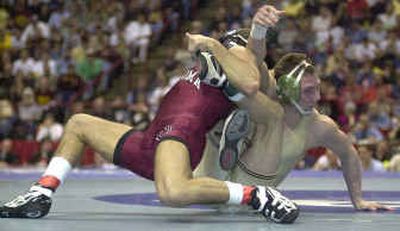Lawrence takes shot at Real Pro Wrestling

Jared Lawrence knows the next few years will be difficult, filled with six-hour daily workouts and scant paychecks if he wants to achieve his dream of wrestling in the 2008 Olympics in Beijing.
With a degree in business and marketing from the University of Minnesota, the Sandpoint native is eminently qualified to enter the workforce at a sufficient wage.
His dream won’t let him go that route.
“It’s there,” Lawrence said, “but the question is five years from now will I be saying, ‘I wish I hadn’t done that?’ I have the rest of my life to work. I only have a window of a few years for wrestling.”
So he took a job in TV wrestling instead. It’s not what you think. There are no entourages, no phony referees, no eye-gouging and no prematch prattling on the microphone. It’s called Real Pro Wrestling and it begins an eight-week run Sunday on PAX and Wednesday on Fox Sports Net.
Postcollegiate wrestlers have few options if they want to continue in their sport. Real Pro Wrestling, the brainchild of two former Northwestern University wrestlers, provides another competitive outlet.
“They can try to make some money while training for the next Olympics,” said North Idaho College coach Pat Whitcomb, who isn’t involved in RPW, but supports the concept. “It’s just another avenue for them.”
Lawrence is wrestling for the RPW’s Minnesota Freeze, coached by University of Minnesota coach J Robinson. In the inaugural season, Lawrence essentially competes in a single-elimination tournament against most of the top U.S. wrestlers in the 145-pound (66 kilogram) division.
The show was filmed in October and Lawrence isn’t permitted to reveal the results. RPW features a raised ring inside a small arena. Wrestlers make dramatic entrances down a ramp to the ring with blaring music and flashing lights. If a wrestler gets tossed out of bounds in RPW, he falls down a padded slope, hoping to have his fall broken by some fellows holding giant cushions.
The rules have been altered slightly. An Olympic takedown is worth one point; in RPW, it’s worth two. If a wrestler is tossed out of bounds, his opponent receives a point.
Lawrence’s division features former NCAA champions Jesse Jantzen, Doug Schwab, Eric Larkin, Chris Bono and Tony Davis. Jamill Kelly, who defeated Lawrence in the 2004 U.S. Olympic Trials and went on to earn an Olympic silver medal, may be retired.
“It was loaded,” said Lawrence, a graduate assistant coach at Minnesota. “It’s a good show.”
RPW organizers eventually want to line up owners for the eight teams, but the immediate goal is survival. That means earning decent TV ratings, which won’t be easy initially. RPW will be up against the NCAA Tournament on Sunday. Former Olympic champion Rulon Gardner is a RPW commentator.
“Right now, they’ll probably be losing money or making very little,” Lawrence said. “If the ratings are up, it would really help.”
Lawrence’s wrestling odyssey has recently taken him to Colorado, Cuba and Uzbekistan. Lawrence took first at the Dave Schultz Memorial Tournament in Colorado Springs in early February. Later that month, Lawrence beat Bono 3-1 in the bronze-medal match in Cuba.
Lawrence’s latest venture, to Uzbekistan for the World Cup, was difficult from a competition and travel standpoint. He was scheduled to leave on a Tuesday and arrive on a Thursday. He ended up arriving on Saturday morning after a seven-hour flight. He rested for a couple of hours before heading to the arena.
He didn’t have any equipment, so he had to borrow from U.S. wrestler Mike Zadick, a Great Falls, Mont., native. Zadick’s shoes and singlet fit and Lawrence made a respectable showing, despite his travel problems.
Next up is the U.S. Open in late April and possibly a second season of RPW.
“When you’re training for the Olympics, you can’t really hold a job,” said Lawrence, who wrestles for the Minnesota Storm club team. “I couldn’t work 40 hours a week and still train six hours a day. So I’m working on a couple of different things, trying to get some sponsorships and figure something out.”